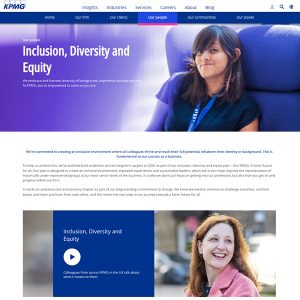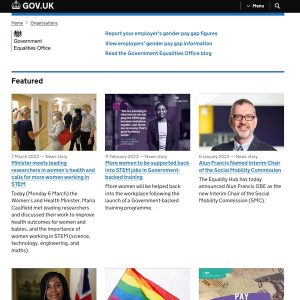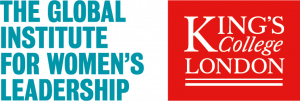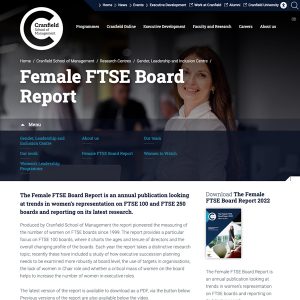Our Partners
There are many organisations large and small, plus individual business men and women, whose efforts on the subject of Women on Boards and in gender balance in senior leadership are contributing a change in the culture at the very top of British business. They are too numerous to mention individually, but here are a few of those partners we have worked most closely with and who have donated freely of their resources to help make gender inequality in the boardroom a topic of the past.
Our sincere thanks to all our partners.
Corporate Partners

KPMG are proud to be longstanding sponsors of the FTSE Women Leaders Review (and the previous Hampton Alexander Review).
At KPMG, we’re committed to creating an inclusive environment where all colleagues thrive and reach their full potential, whatever their identity or background. To help us achieve this, we’ve outlined bold ambitions as part of our inclusion, diversity and equity plan – Our KPMG: A fairer future for all. Our plan is designed to create an inclusive environment, equitable experiences and accountable leaders, which will in turn help improve the representation of historically under-represented groups at our most senior levels of the business. It is why we don’t just focus on getting into our profession, but also how you get on and progress within our firm.
Alongside our commitment to the FTSE Women Leaders Review:
- We’ve committed to having 40:40:20 representation at partner level by 2030. The target requires us to have a minimum of 40% female colleagues and 40% male colleagues in the relevant population;
- We’re a signatory of the HM Treasury Women in Finance Charter and the Tech Talent Charter;
- We’re represented on groups including Women in Tech, Women of the Future, Council for investing in women entrepreneurs and Women on the Wharf. KPMG are also the Global Lead Sponsors of Women Corporate Directors;
- In areas that have historically lacked women’s representation, such as Deal Advisory and Technology, we run specific Insight Programmes. And to support progression of women in the firm, we have a number of dedicated initiatives including personal development programme GROW and our award-winning IT’s Her Future programme.
- We have our KPMG Board Leadership Centre programme and KPMG Connect On Board platform, for our clients and external network, supports women’s professional development and progression into non-executive director roles.
KPMG is recognised for its leadership in promoting the wider inclusion agenda including featuring in the Times Top 50 Employers for Women since inception, being ranked in the Stonewall Top 100, and in 2018, being named ‘Influential Business of the Year’ in the Disability Smart Awards, Best Employer for Race in the Business In the Community awards, and ranking number one in the Social Mobility Employer Index.

While Lloyds Banking Group has provided support to the review over the last few years, as of 2022 we are excited to be working with them as our new formal corporate sponsors, alongside KPMG.
“Being able to attract, develop and retain top talent is highly important to us, and we recognise that companies with gender diverse senior management teams see increased performance, and make better decisions. For this reason, Lloyds Banking Group has made a commitment to be a leader in gender diversity. We are working towards an ambition of 50% of senor leadership roles being held by women by 2025.”
In addition to being the proud sponsor of the FTSE Women Leader Review, Lloyds Banking Group has a rich history of advocacy for women in senior positions and diversity and inclusion more broadly. They:
- Were the first FTSE 100 organisation to establish a gender target to improve the representation of women in senior positions in 2014. We advanced from 28% in 2014 to over 40% today.
- Were among the first signatories to the Women in Finance Charter in 2016.
- Have been a proud sponsor of the Women of the Future Ambassadors Programme for the last seven years, providing mentors and role models and strengthening the pipeline of talent among young women.
- At the end of 2023, women made up 45% of our Board and 43% of our Group Executive Committee. We have achieved all of the recommendations set by the FTSE Women Leaders Review ahead of the 2025 target date.
Lloyds Banking Group has been recognised for its dedication and leadership when it comes to promoting the inclusion and diversity agenda and have been recognised as a Times Top Employer for Women for the last ten consecutive years, featured in the Bloomberg Gender-Equality Index for the last three years and recognised by Working Families as a Top 10 Employer for working families for the last six years.
Government Partners

The Department for Business & Trade
The Review has the support of DBT Ministers, and we are fortunate to benefit from the administrative/secretarial support of a small dedicated team within DBT.
DBT is the department for economic growth. The department supports businesses to invest, grow and export, creating jobs and opportunities across the country.
In 2010 the Government asked Lord Davies of Abersoch to review the representation of women at board level, to identify barriers to women reaching the top and make recommendations to increase the number of women serving on the boards of Britains’ largest companies.
Sir Philip Hampton and Dame Helen Alexander were asked by the then Business Department to continue the drive for more women on FTSE 350 Boards with a new important focus on leadership ranks under their own review at the beginning of 2016.

The Government Equalities Office (GEO)
GEO is responsible for equality strategy and legislation across government. They work to take action on the government’s commitment to remove barriers to equality and help to build a fairer society, leading on issues relating to women, sexual orientation and transgender equality.
The Review is fortunate to benefit from the analyst support of a small dedicated team within GEO.
Research Partners
The Investment Association
The UK investment management industry plays a major role in the economy, helping millions of individuals and families achieve their life goals by helping grow their investments (mainly through workplace pensions).
The Investment Association is the trade body and industry voice for UK investment managers. Members range from small, independent UK investment firms to Europe-wide and global players. Collectively, they manage over £7.7 trillion of assets on behalf of their clients in the UK and around the world. The Investment Association act as their voice and represent their interests to policymakers and regulators, and help explain to the wider world what the industry does.

King’s College London
The Global Institute for Women’s Leadership brings together rigorous research, practice and advocacy to better understand and address the causes of women’s underrepresentation in leadership positions across sectors and countries and the way gender negatively impacts the evaluation of women leaders
The Institute undertakes a range of activities designed to strengthen:
- Research – drawing together existing findings and undertaking new studies.
- Engagement – bringing together experts and stakeholders from across the world.
- Practice – using research to deliver evidence-based training and teaching.

30% Club
The 30% Club aims to develop a diverse pool of talent for all businesses through the efforts of its Chair and CEO members who are committed to better gender balance at all levels of their organisations. Business leadership is key to their mission, taking the issue beyond a specialist diversity effort and into mainstream talent managementThe 30% Club believes that gender balance on boards not only encourages better leadership and governance, but diversity further contributes to better all-round board performance, and ultimately increased corporate performance for both companies and their shareholders.

Cranfield
Since 1999, Cranfield have been publishing an annual Female FTSE benchmarking report that has provided a regular measure of the number of women executive directors on the corporate boards of the UK’s top 100 companies.They are committed to helping organisations to develop the next generation of leaders from the widest possible pool of talent. They are unique in focusing their research, management development and writing on gender diversity at leadership level.
It is widely recognised that there is a gender imbalance at senior management/leadership level. The Centre aims first to understand the issues facing senior women managers, and second the impact of organisational and personal factors on women’s managerial careers. Cranfield provide much of the research and data analytics that go into the FTSE Women Leaders annual reports.



